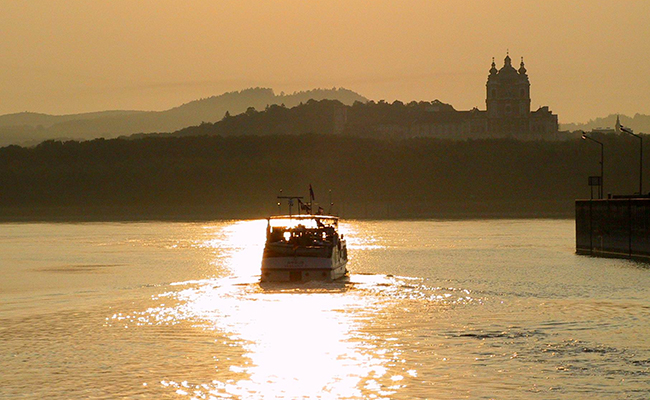PROMISCES project supports the development of a sustainable circular economy

Danube near Melk | From the archive of the Institute for Water Quality and Resource Management, TU Wien
ICC Water & Health researchers are working with a European consortium to remove pollutants from soil and groundwater. ICC Water & Health researchers from TU Wien are in charge of the case study "Danube catchment area".
The goal of a sustainable circular economy drives the experts of the European PROMISCES project, who have joined forces to develop innovative solutions for removing pollutants from the environment. The project partners have just signed a €12 million contract with the European Commission that makes PROMISCES part of the European Green Deal.
Understanding and eliminating pollutants
PROMISCES aims to understand the origin, distribution and fate of pollutants that disperse easily in the environment and are highly persistent. "These harmful substances include polyfluorinated surfactants (PFTs), which we know from animal studies can promote the development of cancer," explains Matthias Zessner. "Furthermore, there is a suspicion that some representatives of PFTs can negatively influence the fertility of women and male sperm maturity." From 1 November 2021, the Horizon 2020-funded project will develop technologies to remove these and other pollutants from soils, sediments, surface and groundwater, as they can be harmful to human health.
"PROMISCES will provide concepts for a low-pollutant circular economy for waters, soils and sediments in the private and public sectors," says Dr Philippe Negrel, PROMISCES coordinator and deputy director of the Water, Environment, Process Development and Analysis Department (BRGM, French Geological Survey).
Twenty-seven partners from nine European countries form an interdisciplinary consortium including academic institutions, private companies, research centres and water utilities. Together they will address the technological challenges and develop recommendations for the implementation of relevant EU policies and guidelines.
Danube River Basin as a case study
To pursue this strategy, PROMISCES will focus on seven representative case studies in different European regions facing chemical pollution problems, including sites in Spain, France, Italy, Bulgaria, Germany and the Danube River Basin from its mouth to Budapest. The TU Vienna researchers are primarily coordinating the "Danube River Basin" case study and monitoring chemical pollution in various environmental compartments. "We record the concentration of selected PFTs, for example in the Danube, its tributaries, groundwater and atmospheric deposition as well as sewage treatment plants," explains Julia Derx. The scientists also aim to model the emission of PFTs via the various input pathways and to investigate the behaviour of polyfluorinated surfactants during bank filtration.
"PROMISCES will develop, test and demonstrate in the field, under real conditions, key technologies and innovations for monitoring, prevention and remediation of persistent, mobile and potentially toxic pollutants from industry in the soil-sediment-water system," explains Dr Julie Lions, deputy coordinator of PROMISCES and expert in groundwater quality (BRGM, French Geological Survey). With its research work, TU Wien is making an important contribution to better understanding the system - including its problems. This understanding ultimately forms the basis for the effective use of technologies to safeguard water resources.
The innovations developed within the framework of PROMISCES should contribute significantly to achieving the goals of the European Green Deal for a safer and more sustainable environment.
Further information at https://cordis.europa.eu/project/id/101036449.
Contact
Univ. Prof. Dr. Matthias Zessner
Institut für Wassergüte und Ressourcenmanagement
Technische Universität Wien
+43 1 58801 22616
matthias.zessner-spitzenberg@tuwien.ac.at
Assist. Prof. Dr. Julia Derx
Institut für Wasserbau und Ingenieurhydrologie
Forschungszentrum Wasser und Gesundheit
Technische Universität Wien
+43 1 58801 22326
julia.derx@tuwien.ac.at
